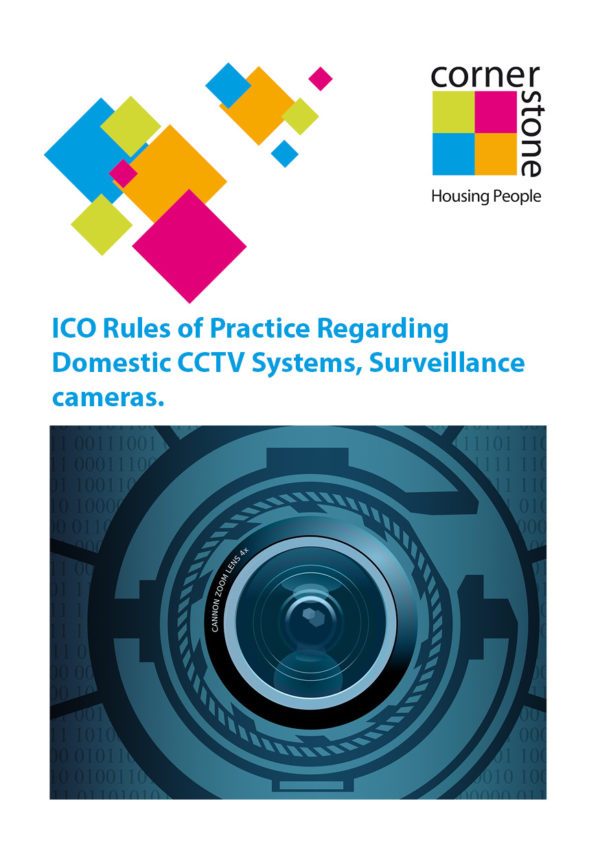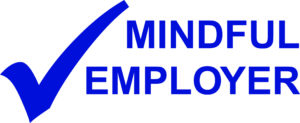CCTV at your home

ICO Rules of Practice Regarding Domestic CCTV Systems, Surveillance cameras.
If you set up your system so it captures only images within the boundary of your private domestic property (including your garden), then the data protection laws will not apply to you. But what if your system captures images of people outside the boundary of your private domestic property – for example, in neighbours’ homes or gardens, shared spaces, or on a public footpath or a street. Then the General Data Protection Regulation (GDPR) and the Data Protection Act 2018 (DPA18) will apply to you, and you will need to ensure your use of CCTV complies with these laws. This guidance refers to them as the ‘data protection laws’.
Regardless of whether or not your use of CCTV falls within the data protection laws, the ICO recommends you use it responsibly to protect the privacy of others.
What must I do if I capture images of people outside my own home and garden?
If you are capturing images beyond your property boundary, you should have a clear and justifiable reason for doing so. In particular, you will need to think why you need these images. If asked by an individual or the ICO, you will need to be able to explain your reasons, so you should write them down now. You should also write down why you think capturing the images is more important than invading the privacy of your neighbours and passers-by.
You will also need to:
- Let people know you are using CCTV by putting up signs saying that recording is taking place, and why.
- Ensure you don’t capture more footage than you need to achieve your purpose in using the system.
- Ensure the security of the footage you capture – in other words, holding it securely and making sure nobody can watch it without good reason.
- Only keep the footage for as long as you need it – delete it regularly, and when it is no longer needed.
- Ensure the CCTV system is only operated in ways you intend and can’t be misused for other reasons. Anyone you share your property with, such as family members who could use the equipment, needs to know the importance of not misusing it.
You also need to make sure you respect the data protection rights of the people whose images you capture. This includes the following things:
- Responding to subject access requests (SARs), if you receive any. Individuals have a right to access the personal data you hold about them, including identifiable images. They can ask you verbally or in writing. You must respond within one month and give them a copy of the data.
- Deleting footage of people if they ask you to do so. You should do this within one month. You can refuse to delete it if you specifically need to keep it for a genuine legal dispute – in which case you need to tell them this, and also tell them they can challenge this in court or complain to the ICO.
- Consider any objection you get now from particular people about capturing their image in the future. Given the nature of CCTV systems, this may be very difficult to do. However, you should again think whether you need to record images beyond your property boundary – particularly if your system is capturing images from a neighbour’s home or garden.
Surveillance Camera Code of Practice
“Surveillance camera systems” has the meaning given by Section 29(6) of the 2012 Act and is taken to include: (a) closed circuit television (CCTV) or automatic number plate recognition (ANPR) systems; (b) any other systems for recording or viewing visual images for surveillance purposes; (c) any systems for storing, receiving, transmitting, processing or checking the images or information obtained from said systems.
Available to read online
https://www.gov.uk/government/publications/cctv-guidance
What happens if I break the law?
If you fail to comply with your obligations under the data protection laws, you may be subject to enforcement action by the ICO. This could include a fine. You may also be subject to legal action by affected individuals, who could pursue court claims for compensation.
If you follow our guidance and take all reasonable steps to comply with your data protection obligations, the ICO is unlikely to regard you as a regulatory risk. So the ICO would be unlikely to think that taking enforcement action against you was a proportionate use of its resources.
What else should I think about?
- Before you install the system, consider speaking to your neighbours and explaining what you are doing. Listen to any objections or concerns they may have. It may also be useful to invite your neighbours to view the footage you capture. This may relieve any concerns they have about your use of CCTV. It may also avoid disputes escalating or complaints being made about your recording.
- The phrase ‘domestic CCTV system’ refers to the use of any video surveillance equipment mounted or fixed on your home. It can include cameras fitted to doorbells.
- You should remember that your use of a domestic CCTV system may be appropriate, but publicly uploading or streaming footage of identifiable people would need more justification. In most cases it would not be justifiable.
- You don’t need to register with the ICO or pay a fee (this is a change from the previous law). However, you must maintain records of how and why you are capturing these images, and for how long you are keeping them. You may need to make these records available to the ICO on request.
What are my rights?
If you are filmed on someone’s domestic CCTV system, which is capturing images outside the boundary of their home, the data protection laws give you several rights. The Information commissioner’s office give the following guidance on what you can do.
You have the following rights:
- To be told that a home CCTV system is being used. The CCTV user must let people know they have CCTV. Signs are the most common way of doing this. They must be clearly visible and legible.
- To ask for a copy of the information that is held about you. This is known as making a subject access request. You can ask verbally or in writing for copies of any footage where your image is identifiable. The CCTV user must respond to this request within one month. Bear in mind that if they regularly delete footage they no longer need, they might not hold your images.
- To ask the CCTV user to erase any personal data they hold about you.
- To ask that the CCTV user does not capture any footage of you in future. However, the nature of CCTV systems may make this very difficult and it might not be possible for the user to do this.
I’m unhappy about the use of a home CCTV system. What can I do?
The following guidance has come direct from the ICO. Click here to complete the online tool to find out what the best course of action is to deal with your CCTV concern.
I’m unhappy about the use of a home CCTV system. What can I do?
1. Have you contacted the CCTV user? I’m unable to contact them
2. Do you feel the person is using CCTV in a way that is anti-social, harassing or intimidating? Yes
Answers – This could be a criminal matter You should consider contacting the police on 101.


